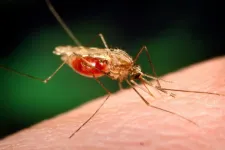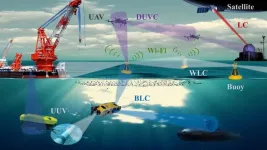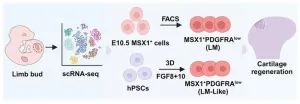(Press-News.org) EAST LANSING, Mich. — Effective population level vaccination campaigns are fundamental to public health. Countercampaigns, which are as old as the first vaccines, can disrupt uptake and threaten public health globally.
Even before March 2020, vaccine hesitancy was directly linked to misinformation — false, inaccurate information promoted as factual — on social media. Once COVID-19 reached pandemic status, social media was acknowledged as the epicenter of information leading to vaccine hesitancy, which the World Health Organization, or WHO, defines as “a delay in acceptance or refusal of vaccination despite availability of vaccination services.”
Young Anna Argyris, associate professor in the Michigan State University Department of Media and Information, is part of an international team studying the detrimental effects of vaccine misinformation on social media and interventions that can increase vaccine uptake behaviors.
The team, led by Columbia College Professor Kai Ruggeri, recently had a study published in the British Medical Journal, or BMJ, which is ranked eighth among all research journals in the world. “Misinformation is not new, and its noxious consequences are not unsurmountable, but its effect on vaccine hesitancy through social media is an urgent global threat to public health,” Argyris said. “Increasingly robust evidence has shown the drivers and effects of this phenomenon, but few successful interventions exist.”
Argyris has been researching vaccine hesitancy, misinformation and social media since 2018. In 2022, she and her graduate student colleagues published a study on intervention-based social media campaigns. The study caught the eye of Ruggeri, who then asked Argyris to contribute to the BMJ article.
“My research aims to alleviate bias, misjudgment and delays in decision-making, thereby improving effectiveness and efficiency — and, consequently, equity and quality of life in our society,” Argyris said.
In the BMJ article, Argyris and her co-authors outline 10 insights, based on existing research, that should help provide a clear, specific, evidence-driven toolkit to reduce vaccine hesitancy:
1. Negative sentiments on social media might increase vaccine hesitancy faster than interventions reduce it.
There is ample evidence of a proliferation of anti-vaccine messages on social media leading to organized offline actions and increased hesitancy. There is less evidence that efforts to specifically mitigate misinformation have had a reliable effect on real-world uptake.
2. Messaging seems to work best when it is tailored to what groups know and care about.
Once misinformation and conflicting views are prevalent, speaking directly to audiences, knowing the reasons for hesitancy and framing information in a way that matters to individuals are crucial.
3. Simple messaging about benefits and risks based on probabilities is not enough.
Messages must be conveyed in a way that affirms individual cultural values, deals with topics of importance to individuals — not only health facts — and uses credible sources of information. Visual imagery also helps deliver effective messages.
4. Correct misinformation to both parents and their children.
Addressing parents is clearly of value, but young people also seek out information online for themselves. Directly involving parents and young people in the design of messaging might strengthen the effectiveness of child vaccination campaigns.
5. Trust matters: the message, the messenger and the (vaccinated) provider.
Trust is potentially the most distinct characteristic of successful vaccination campaigns, including ones delivered on social media. The source of the message, whether a health care provider, politician or social media influencer, is likely to have a major role in whether individuals and communities deem information credible. These interventions have great potential when delivered to the right populations.
6. Debunking efforts have shown mixed effects on social media.
Distributing information from public institutions or providing objecting information from third parties might help to counter misinformation, reduce the intention to spread misinformation and promote health behaviors, but the process isn’t always smooth. The backfire effect is a concerning pattern in which disproving misinformation reinforces it and it deepens false beliefs.
7. Raising the quality and visibility of reliable information can counter misinformation.
The high volume of misinformation appearing in online searches can override more reliable sources, limiting the effectiveness of information on how, where and when to get a vaccine. Graphics, posters and videos help target populations see and engage with accurate, accessible information.
8. Framing of vaccine messages matters.
A public campaign can’t cover all vaccines, diseases, populations and reasons for hesitancy. Framing messages to be directly relevant to a populations’ needs — addressing the benefits and risks specific to the population group — have resulted in significant increases in vaccine uptake.
9. Blanket bans can drive groups and activities underground.
Broad social media bans of individuals or of specific content can paradoxically result in the spread of misinformation and can galvanize echo chambers by driving discussion into private social media groups or closed forums.
10. Social media platforms need to be part of the solution.
Social media companies should be more proactive in dealing with the abundance of misinformation on their sites. Making data available and working with researchers and regulators in all countries is critical in developing effective solutions to address misinformation.
###
Michigan State University has been advancing the common good with uncommon will for more than 165 years. One of the world’s leading public research universities, MSU pushes the boundaries of discovery to make a better, safer, healthier world for all while providing life-changing opportunities to a diverse and inclusive academic community through more than 400 programs of study in 17 degree-granting colleges,
END
MSU co-authored study: 10 insights to reduce vaccine hesitancy on social media
2024-02-29
ELSE PRESS RELEASES FROM THIS DATE:
New study: Deforestation exacerbates risk of malaria for most vulnerable children
2024-02-29
Malaria kills more than 600,000 people each year worldwide, and two thirds are children under age five in sub-Saharan Africa. Scientists have found a treatment that could prevent thousands of these deaths: trees. New research conducted at the University of Vermont (UVM) and published today in the journal GeoHealth suggests forests can provide natural protection against disease transmission, particularly for the most vulnerable children.
Malaria spreads through the bite of Anopheles mosquitoes. While malaria is a disease long associated with lower socioeconomic status, the UVM study links deforestation with higher risk of the disease, particularly for ...
DOE announces plans to host an informational meeting and requests expressions of interest for the Thomas Jefferson National Accelerator Facility Management and Operating Contract Competition
2024-02-29
Washington, D.C. – The U.S. Department of Energy (DOE) announced the schedule for upcoming events and submissions associated with the competition for the management and operating contract for the Thomas Jefferson National Accelerator Facility (TJNAF).
TJNAF is a DOE national laboratory and DOE-sponsored Federally Funded Research and Development Center that has a mission focused on delivering breakthrough science and technology in nuclear physics.
DOE will host an informational meeting and site tour on March 27, 2024 at TJNAF to provide information regarding the site to interested parties. ...
Changes in flu circulation means US likely to see vaccines move from quadrivalent to trivalent
2024-02-29
U.S. flu vaccines are likely to move from quadrivalent to trivalent due to a change in circulating influenza viruses, says a University of Michigan researcher.
Currently, all influenza vaccines in the United States are quadrivalent, meaning that they protect against four different flu viruses.
In a new paper published in the New England Journal of Medicine, researchers detail the spread of influenza B/Yamagata virus, which has not been in circulation since early 2020; the regulatory discussions and recommendations on updating vaccines; and the manufacturing considerations ...
Accreditation with commendation awarded to the American College of Chest Physicians
2024-02-29
Glenview, IL– The American College of Chest Physicians® (CHEST) has received accreditation with commendation from the Accreditation Council for Continuing Medical Education (ACCME) and reaccreditation from the Society for Simulation in Healthcare (SSH).
This achievement grants CHEST reaccreditation through November 2029 and places the organization in the highest tier of all continuing medical education (CME) providers, including some of the nation’s most prestigious medical schools and professional medical societies.
“Receiving reaccreditation with commendation from the ACCME is a real testament to the education team at CHEST including both internal ...
Hahn awarded CZI grant to monitor, manipulate proteins important in nervous system function, neurological disease
2024-02-29
CHAPEL HILL, N.C. – The Chan Zuckerberg Initiative (CZI) announced four multi-year Exploratory Cell Networks grants for researchers exploring the frontiers of genomics, cell biology, and synthetic biology by developing new measurement technologies. The projects will be bringing together regional labs in California, the Mid-Atlantic, and the Research Triangle.
Klaus Hahn, PhD, the Ronald G. Thurman Distinguished Professor of Pharmacology and member of the UNC Lineberger Comprehensive Cancer Center, will be co-leading a ...
All-light communication network bridges space, air and sea for seamless connectivity
2024-02-29
WASHINGTON — Researchers have developed an all-light communication network that enables seamless connectivity across space, air and underwater environments. The new network design combines different types of light sources to ensure connectivity no matter the environment.
“In today’s world, data transmission is critical for communication, navigation, emergency response, research and commercial activities,” said research team leader Yongjin Wang from Nanjing University of Posts and Telecommunications and ...
Parents, wealth, race drive girls’ chances to play sports
2024-02-29
COLUMBUS, Ohio – The likelihood that a girl will participate in high school sports in the United States is driven not so much by individual choice, new research suggests. Instead, decisions made by parents, the wealth of one’s family and community, and racial dynamics matter.
By combining interviews with elite college athletes and analysis of data on over 4,000 high school girls, researchers found that socioeconomic status – of families and the school districts in which they live ...
Study sheds light on how neurotransmitter receptors transport calcium, a process linked with origins of neurological disease
2024-02-29
A new study from a team of McGill University and Vanderbilt University researchers is shedding light on our understanding of the molecular origins of some forms of autism and intellectual disability.
For the first time, researchers were able to successfully capture atomic resolution images of the fast-moving ionotropic glutamate receptor (iGluR) as it transports calcium. iGluRs and their ability to transport calcium are vitally important for many brain functions such as vision or other information coming from sensory organs. Calcium also brings about changes in the signalling capacity of iGluRs ...
Artificial intelligence reveals prostate cancer is not just one disease
2024-02-29
Artificial Intelligence has helped scientists reveal a new form of aggressive prostate cancer which could revolutionise how the disease is diagnosed and treated in the future.
A Cancer Research UK-funded study published today, 29 February 2024, reveals that prostate cancer, which affects one in eight men in their lifetime, includes two different subtypes termed evotypes.
The discovery was made by an international team led by the University of Oxford, and the University of Manchester, who applied AI (artificial intelligence) on data from DNA to identify two different subtypes affecting the prostate.
The team hope their findings could save thousands ...
New type of stem cells contains potential for knee cartilage regeneration in arthritic mice
2024-02-29
Osteoarthritis (OA) is a debilitating joint disease which affects over 500 million people worldwide, with trends increasing as populations age. OA is caused by progressive, irreversible degeneration of joint cartilage, leading to pain, swelling and immobility in the affected joint. Current therapies focus on symptom relief but cannot restore degenerated cartilage.
A potentially alternative treatment is the regeneration of cartilage from stem cells. Importantly, not all types of stem cells can make cartilage and earlier clinical trials with mesenchymal stem or stromal cells (MSCs) obtained did not convincingly show that MSCs make new cartilage when given to OA patients. In search for the ...





